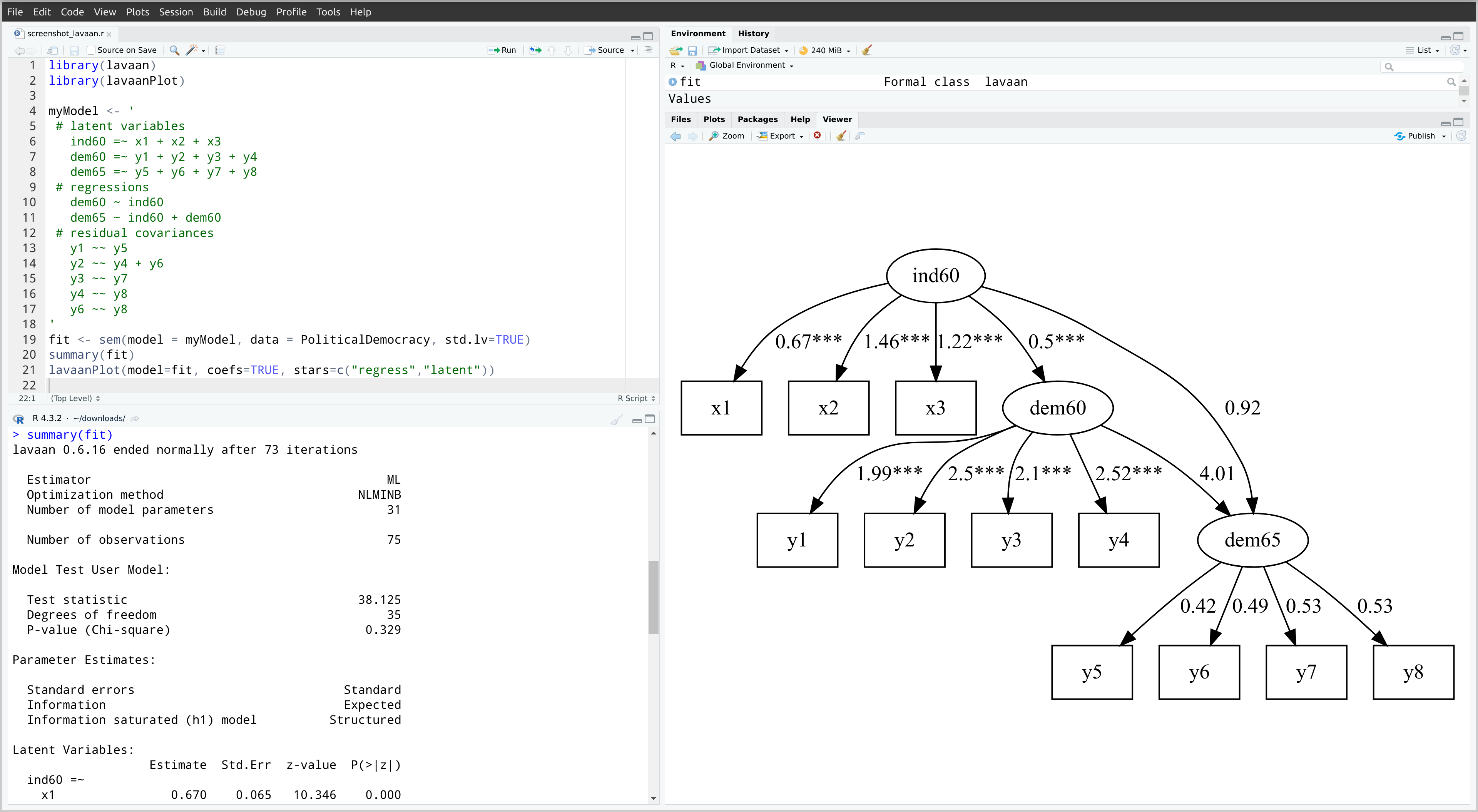Workshop on Latent Variable Modeling with the lavaan Package
General Information
| Date | March 8th, 2024 |
| Time | 9:00 - 17:00 |
| Location | Hotel van der Valk Nijverheidsweg 35 6227 AL Maastricht |
| Fee | • 50 Euros for PhD students, post-docs, and beyond • free for Master students if places are available • note: lunch is included in the registration fee |
| Instructor | Yves Rosseel (author of the lavaan package) |
Workshop Description
Broadly speaking, latent variable models are statistical models that describe and model the relationships between observable and latent variables. Models of this form are used for various types of analyses including confirmatory factor analysis (CFA), structural equation modeling (SEM), mediation analyses, and growth curve modeling.

In this workshop, you will learn how to conduct such analyses using the lavaan package, a free and open-source add-on to the statistical programming language R. The lavaan package rivals commercially available software (such as LISREL, Mplus, Amos, and EQS) in terms of functionality and makes fitting latent variable models extremely easy. Time permitting, we will also cover topics such as multigroup models, measurement invariance, missing data, the analysis of non-normal / categorical data in the context of latent variable models, and longitudinal / multilevel models.
The workshop will be given directly by the author of the lavaan package, Yves Rosseel, Professor of Data Analysis at Ghent University.
Workshop Prerequisites / Preparations
In general, all efforts will be made to make the workshop as self-contained as possible, but basic knowledge of statistical methods (e.g., regression, hypothesis testing) is assumed. In case you are not familiar with R (or just need a refresher), the R User Group at Maastricht University will hold a session before the workshop where we will go over some of the basics of working with R. Keep an eye on the schedule for the specific date of this session.
Please bring a laptop with a current version of R installed to the workshop. You can download R for free from the Comprehensive R Archive Network (CRAN). If you already have R installed, please double-check that it is a relatively recent version (the current version is 4.3.2, but slightly older versions should also be ok). Although not strictly necessary, it will also be useful to install an integrated development environment (IDE) for R, which makes the use of R a more user-friendly experience. A popular choice these days is RStudio, which you can download for free from here.
Once R (and RStudio) are installed, please also install the lavaan package. You should be able to install the package by starting R/RStudio and then typing install.packages("lavaan") into the ‘Console’. As long as you do not get an error message, then the installation was successful. You can also double-check this by loading the package with library(lavaan) (you should get a message that states ‘This is lavaan’ followed by some additional text). If you have problems with installing any of the software (i.e., R, RStudio, and/or lavaan), you can come to the preparation session mentioned above for assistance.
Registration
Please note that the workshop is primarily meant for those affiliated with Maastricht University (if you are not affiliated with the university but would like to attend, please send an email to Wolfgang Viechtbauer at wolfgang.viechtbauer@maastrichtuniversity.nl to discuss this). To register for the workshop, please send an email to Ine Schaapkens at ine.schaapkens@maastrichtuniversity.nl with the subject “Registration for lavaan Workshop”. Aside from your name and email address, we also need to know your department within the university and your position (i.e., are you a Master student or a PhD student, post-doc, or beyond?).
You will be notified upon receipt of the email whether there are still open places available for the workshop (the maximum number of participants is 50). If so, then you can complete your registration by paying the registration fee of 50 Euros (instructions will be provided via e-mail).
Funding
This workshop is made possible by funding from the Department of Psychiatry and Neuropsychology and the Department of Methodology and Statistics at Maastricht University.